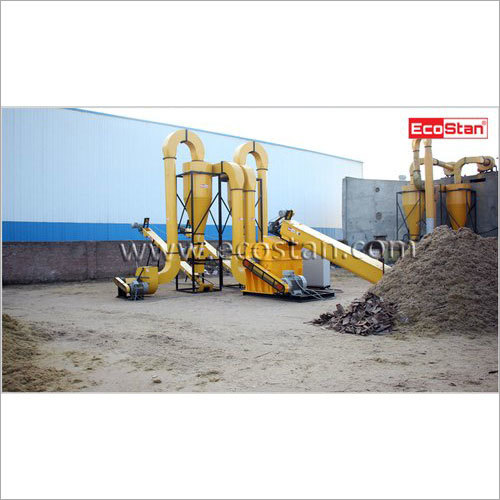बायोमास हैमर मिल
उत्पाद विवरण:
- रोटेशन Unidirectional/Clockwise
- मॉडेल Standard or customized models
- प्रॉडक्ट टाइप Biomass Hammer Mill
- सामान्य उपयोग Grinding biomass material for pellet and briquette production
- मटेरियल
- टाइप करें
- क्षमता 500-3000 kg/hr (depending on model & material)
- अधिक देखने के लिए क्लिक करें
बायोमास हैमर मिल मूल्य और मात्रा
- , सेट/सेट्स
- सेट/सेट्स
- 1
बायोमास हैमर मिल उत्पाद की विशेषताएं
- Depends on model; approx. 8-12 m²
- Biomass Hammer Mill
- Unidirectional/Clockwise
- Grinding biomass material for pellet and briquette production
- 1250-3200 kg (model dependent)
- 1400-2800 RPM
- Approx. 1800 x 1350 x 1400 mm (varies by capacity/model)
- 500-3000 kg/hr (depending on model & material)
- 22-110 kW (varies by model)
- Standard or customized models
- 380V / 415V, 3 Phase, 50/60Hz
बायोमास हैमर मिल व्यापार सूचना
- 1 प्रति महीने
- 30 दिन
उत्पाद वर्णन
Biomass Hammer Mill is a heavy duty grinding unit which works by making hard impacts on the raw materials by rotating hammers. It is designed and developed as per the industrial standards which results in higher efficiency and durability. This industrial unit requires very less maintenance due to its highly durable and sturdy construction. It is equipped with a high speed electrical motor which rotates the shaft on which the hammers are fixed.
उत्पाद विवरण
| Capacity(T/h) | 250 kg/hr - 7000 kg/hr |
| Power | 15hp-179.5hp |
| Usage/Application | Grinding |
| Capacity | 250kg/hr-9000kg/hr |
| Model Name/Number | HM20-HM120 |
| Handled Material | agricultural and forest waste |
| I Deal In | New Only |
| Warranty | 1 year |
| Color | Yellow |
| Automation Grade | Automatic |
| Brand | ECOSTAN |
| Material | Mild Steel |
Specification
Model No. | Production | Power requirements |
HM 120 | Up to 7000 kg/hr | 199.5 HP |
HM 100 | Up to 5000 kg/hr | 151 HP |
HM 60 | Up to 3000 kg/hr | 84 HP |
HM 50 | Up to 2000 kg/hr | 65 HP |
HM 40 | Up to 1300 kg/hr | 52.5 HP |
HM 20 | Up to 600 kg/hr | 28 HP |
HM 10 | Up to 250 kg/hr | 15 HP |
Efficient Biomass Grinding for Multiple Applications
The Biomass Hammer Mill excels in the efficient reduction of raw biomass materials, preparing them for pellet or briquette production, animal feed, or combustion fuel. Designed to handle various input sizes with robust performance, this versatile machine can be deployed in both stationary and mobile setups, making it adaptable for different industrial production environments.
Heavy-Duty Construction and User Safety
Constructed with high-quality alloy steel, the dynamically balanced rotor and reinforced frame deliver durability and consistent performance. The inclusion of overload protection and an emergency stop ensures operational safety, while the low noise and adaptable dust-collection compatibility help maintain a safe, clean workspace.
Low Maintenance and Flexible Operation
Easy access mechanisms make for quick hammer and screen replacement, minimizing downtime and maintenance costs. The mill supports both manual and semi-automatic control systems, offering flexibility in operations according to production requirements and operator preference.
FAQs of Biomass Hammer Mill:
Q: How does the Biomass Hammer Mill process raw materials for pellet production?
A: The mill uses 1632 alloy steel hammers mounted on a dynamically balanced rotor to grind and pulverize raw biomass materials up to 50 mm. The ground material is reduced to less than 6 mm, suitable for pelletizing or briquetting, with adjustable sieves to control discharge size.Q: What are the main benefits of using this hammer mill in biomass and feed applications?
A: Key benefits include high grinding efficiency, reliable heavy-duty operation, ease of maintenance, low noise levels (<85 dB), and compatibility with dust collection systems, which collectively support safer and cleaner processing environments in pellet, feed, and fuel production.Q: When should the hammers and screens be replaced or maintained?
A: Regular inspection is recommended, depending on usage and material type. Easy access to the grinding chamber simplifies replacing worn hammers or screens, ensuring consistent performance and product quality.Q: Where can the hammer mill be installed and used?
A: It is suitable for factories, feed mills, pellet production lines, or fuel processing facilities. With both stationary and mobile models, installation can be tailored to specific site layouts and mobility requirements.Q: What is the process for adjusting discharge particle size?
A: The discharge size is controlled by interchangeable sieve screens. Operators can swiftly change the sieve according to the desired final material size, typically down to less than 6 mm for most biomass applications.Q: Can the hammer mill operate under high temperatures and continuous use?
A: Yes, it is engineered for continuous operation at up to 60C. Its robust design, overload protection, and efficient cooling mechanisms make it suitable for intensive industrial workflows.Q: What power options and control systems are available with the hammer mill?
A: Depending on the model, power requirements range from 22 to 110 kW at 380V/415V, 3 phase, 50/60Hz. Users can choose between manual and semi-automatic control systems, allowing configuration flexibility to match production needs.
Price: Â
- 50
- 100
- 200
- 250
- 500
- 1000+





